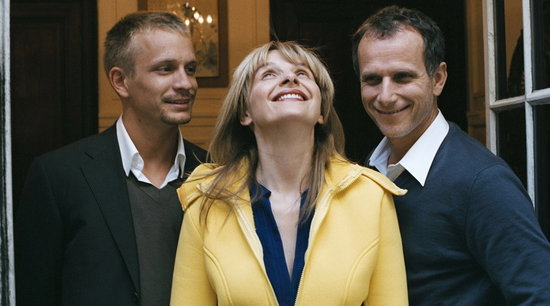
SUMMER HOURS kicks off Olivier Assayas retrospective at BAM
SUMMER HOURS (L’HEURE D’ÉTÉ) (Olivier Assayas, 2008)
BAMcinématek
30 Lafayette Ave. between Ashland Pl. & St. Felix St.
Saturday, October 9, 6:30 & 9:15
Series continues through October 28
718-636-4100
www.bam.org
www.summerhours.com.au
 In conjunction with his recent appearance at the New York Film Festival discussing his life and career and presenting his latest film, the five-and-a-half-hour CARLOS, about the notorious assassin Carlos the Jackal, BAMcinématek will be screening seventeen of French writer-director Olivier Assayas’s works, which range from ultracool flicks to boring dramas, but they’re almost always visually stunning, filled with cinematic references and hip music. The series begins October 9 with SUMMER HOURS, which falls somewhere in the middle of his oeuvre.
In conjunction with his recent appearance at the New York Film Festival discussing his life and career and presenting his latest film, the five-and-a-half-hour CARLOS, about the notorious assassin Carlos the Jackal, BAMcinématek will be screening seventeen of French writer-director Olivier Assayas’s works, which range from ultracool flicks to boring dramas, but they’re almost always visually stunning, filled with cinematic references and hip music. The series begins October 9 with SUMMER HOURS, which falls somewhere in the middle of his oeuvre.
At their annual family gathering, Frédéric (Charles Berling), Adrienne (Juliette Binoche), and Jérémie (Jérémie Renier) are celebrating their mother’s seventy-fifth birthday. But Hélène (Edith Scob) does not care about the present; instead, she is more concerned with preserving the past and preparing for the future. She pulls aside her oldest, Frédéric (Assayas’s on-screen alter ego), to tell him what to do with her belongings after she’s gone, but he is not ready to think about that. Her house is more like a museum, filled with valuable works of art and furniture that were collected by her uncle, a famous painter who died thirty years before. Frédéric would prefer to keep the house intact, donating a few items to the Musee d’Orsay and saving the rest for the next generation, but Adrienne and Jérémie don’t necessarily feel the same way, and Frédéric’s and Jérémie’s kids fail to see any value in the pieces, including two oil paintings by Camille Corot, begrudgingly noting that they’re from a different era. While Frédéric, a professor who has written a controversial book about the state of the economy, attaches personal memories to each object, Adrienne, a successful designer in New York, is more interested in the functionality of things, and Jérémie, who manages a company that profits from cheap labor in China, sees only monetary value. As the three siblings discuss what to do with their mother’s estate, relationships come into focus, and a long-held secret emerges.
Written and directed by Olivier Assayas (LES DESTINÉES SENTIMENTALES, DEMONLOVER, IRMA VEP), SUMMER HOURS, which was selected for the 2008 New York Film Festival, is a thoughtful, intelligent slice-of-life story that avoids overbearing cliches and melodramatic moments; there are no blow-ups or overemotional scenes. Instead, the family deals with its situation directly and matter-of-factly, a sort of French CHERRY ORCHARD for the twenty-first century. However, Assayas does include far too many red herrings, little flourishes of cinematic language that seem to set something up that never comes full circle. The project was initiated by the Musee d’Orsay, which had commissioned a group of international directors to make short films related to the institution’s holdings. Assayas’s friend and colleague Hou Hsiao Hsien ended up making the full-length FLIGHT OF THE RED BALLOON, which also starred Binoche. Although the project later fell apart, Assayas combined the idea with the worsening condition of his mother, resulting in a bittersweet and very personal work.
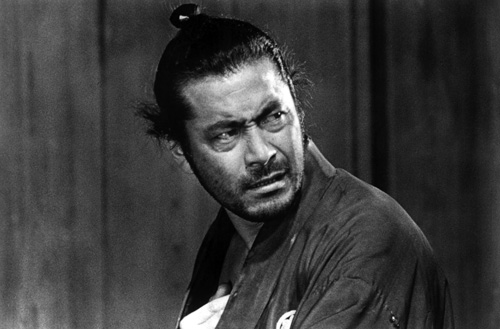
 In Akira Kurosawa’s sort-of sequel to YOJIMBO based on Shūgorō Yamamoto’s short story “Peaceful Days,” Toshirō Mifune returns as Tsubaki Sanjuro, a rogue samurai who shows up in a small town looking for food and fast money and takes up with a rag-tag group of wimps who don’t trust him when he says he will help them against the powerful ruling gang. Also back is Tatsuya Nakadai, this time as his accomplice Hanbei. Funnier than most Kurosawa samurai epics, the film is unfortunately brought down a notch by a bizarre soundtrack that ranges from melodramatic claptrap to a jazzy big-city score. The film is being screened at BAMcinématek as part of the series Kurosawa’s Samurai, which concludes November 21 with the King Lear epic RAN.
In Akira Kurosawa’s sort-of sequel to YOJIMBO based on Shūgorō Yamamoto’s short story “Peaceful Days,” Toshirō Mifune returns as Tsubaki Sanjuro, a rogue samurai who shows up in a small town looking for food and fast money and takes up with a rag-tag group of wimps who don’t trust him when he says he will help them against the powerful ruling gang. Also back is Tatsuya Nakadai, this time as his accomplice Hanbei. Funnier than most Kurosawa samurai epics, the film is unfortunately brought down a notch by a bizarre soundtrack that ranges from melodramatic claptrap to a jazzy big-city score. The film is being screened at BAMcinématek as part of the series Kurosawa’s Samurai, which concludes November 21 with the King Lear epic RAN.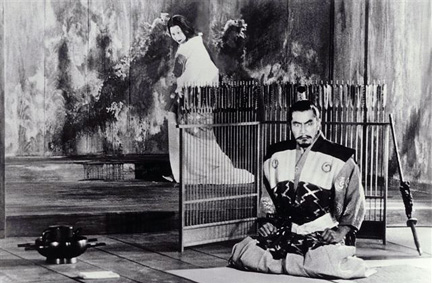
 Akira Kurosawa’s marvelous reimagining of MACBETH is an intense psychological thriller that follows one man’s descent into madness. Following a stunning military victory led by Washizu (Toshirô Mifune) and Miki (Minoru Chiaki), the two men are rewarded with lofty new positions. As Washizu’s wife, Asaji (Isuzu Yamada, with spectacular eyebrows), fills her husband’s head with crazy paranoia, Washizu is haunted by predictions made by a ghostly evil spirit in the Cobweb Forest, leading to one of the all-time classic finales. Featuring exterior scenes bathed in mysterious fog, interior long shots of Washizu and Asaji in a large, sparse room carefully considering their next bold move, and composer Masaru Sato’s shrieking Japanese flutes, THRONE OF BLOOD is a chilling drama of corruptive power and blind ambition, one of the greatest adaptations of Shakespeare ever put on film. BAMcinématek is screening the film in conjunction with the centennial of Kurosawa’s birth and the Next Wave Festival presentation of Ping Chong’s theatrical version of
Akira Kurosawa’s marvelous reimagining of MACBETH is an intense psychological thriller that follows one man’s descent into madness. Following a stunning military victory led by Washizu (Toshirô Mifune) and Miki (Minoru Chiaki), the two men are rewarded with lofty new positions. As Washizu’s wife, Asaji (Isuzu Yamada, with spectacular eyebrows), fills her husband’s head with crazy paranoia, Washizu is haunted by predictions made by a ghostly evil spirit in the Cobweb Forest, leading to one of the all-time classic finales. Featuring exterior scenes bathed in mysterious fog, interior long shots of Washizu and Asaji in a large, sparse room carefully considering their next bold move, and composer Masaru Sato’s shrieking Japanese flutes, THRONE OF BLOOD is a chilling drama of corruptive power and blind ambition, one of the greatest adaptations of Shakespeare ever put on film. BAMcinématek is screening the film in conjunction with the centennial of Kurosawa’s birth and the Next Wave Festival presentation of Ping Chong’s theatrical version of 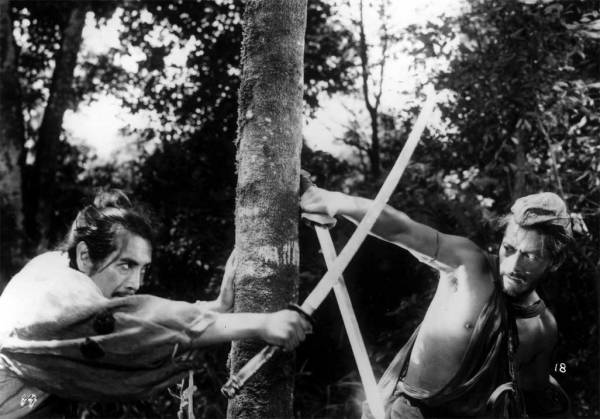
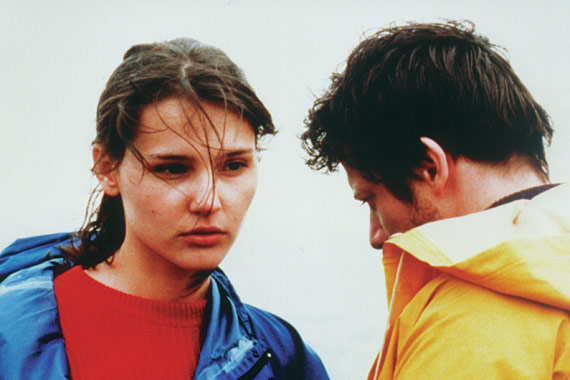
 Boring. If you want to spend a few hours watching a bunch of unlikable French people sipping coffee and talking endlessly about things you’ll never care about, then this is the film for you. Even the wonderful Jeanne Balibar, the star of the magnificent VA SAVOIR (Jacques Rivette, 2001), can’t save this mess about an older writer whom you’ll hate. Assayas is one of those hit-or-miss directors; this one plain stinks. The film is part of the BAMcinématek series Post-Punk Auteur, which concludes with 2007’s BOARDING GATE on October 27 and the 2008 documentary ELDORADO / CREATION on October 28.
Boring. If you want to spend a few hours watching a bunch of unlikable French people sipping coffee and talking endlessly about things you’ll never care about, then this is the film for you. Even the wonderful Jeanne Balibar, the star of the magnificent VA SAVOIR (Jacques Rivette, 2001), can’t save this mess about an older writer whom you’ll hate. Assayas is one of those hit-or-miss directors; this one plain stinks. The film is part of the BAMcinématek series Post-Punk Auteur, which concludes with 2007’s BOARDING GATE on October 27 and the 2008 documentary ELDORADO / CREATION on October 28.
 With their divorce pending, writer-director Olivier Assayas and Hong Kong superstar Maggie Cheung wish each other a fond farewell in the moving drama CLEAN. Named Best Actress at the 2004 Cannes Film Festival for her extraordinary performance, Cheung (HERO, IN THE MOOD FOR LOVE) stars as Emily Wang, a junkie trying to resuscitate the fading music career of her heroin-addicted lover, Lee (British musician James Johnston). Their life together is so screwed up that they rarely see their son, Jay (James Dennis), who lives in Vancouver with Lee’s parents (Nick Nolte and Martha Henry). On the road, Emily scores some drugs, fights with Lee, goes out for a ride, then returns to find him dead from an overdose and the cops waiting to arrest her. After six months in prison, she gets out to find that her life has changed more than she could ever have imagined. Cheung is effervescent every step of the way, lighting up the screen despite playing a very hard-to-like character; her tender scenes with the soft-spoken, grizzled Nolte are particularly gentle and touching. Unfortunately the subplot set in the music world is clichéd, annoying, and mostly unnecessary, everything that the rest of the film is not. The stunt casting is particularly irritating: Tricky, the band Metric, and Mazzy Star’s David Roback all play themselves. The otherwise fine cast also includes Béatrice Dalle, Jeanne Balibar, Don McKellar, and Laetitia Spigarelli, with a soundtrack dominated by ethereal songs by Brian Eno. The film is being shown as part of “Post–Punk Auteur: Olivier Assayas” at BAM, consisting of seventeen films by the French writer-director, continuing through October 28.
With their divorce pending, writer-director Olivier Assayas and Hong Kong superstar Maggie Cheung wish each other a fond farewell in the moving drama CLEAN. Named Best Actress at the 2004 Cannes Film Festival for her extraordinary performance, Cheung (HERO, IN THE MOOD FOR LOVE) stars as Emily Wang, a junkie trying to resuscitate the fading music career of her heroin-addicted lover, Lee (British musician James Johnston). Their life together is so screwed up that they rarely see their son, Jay (James Dennis), who lives in Vancouver with Lee’s parents (Nick Nolte and Martha Henry). On the road, Emily scores some drugs, fights with Lee, goes out for a ride, then returns to find him dead from an overdose and the cops waiting to arrest her. After six months in prison, she gets out to find that her life has changed more than she could ever have imagined. Cheung is effervescent every step of the way, lighting up the screen despite playing a very hard-to-like character; her tender scenes with the soft-spoken, grizzled Nolte are particularly gentle and touching. Unfortunately the subplot set in the music world is clichéd, annoying, and mostly unnecessary, everything that the rest of the film is not. The stunt casting is particularly irritating: Tricky, the band Metric, and Mazzy Star’s David Roback all play themselves. The otherwise fine cast also includes Béatrice Dalle, Jeanne Balibar, Don McKellar, and Laetitia Spigarelli, with a soundtrack dominated by ethereal songs by Brian Eno. The film is being shown as part of “Post–Punk Auteur: Olivier Assayas” at BAM, consisting of seventeen films by the French writer-director, continuing through October 28.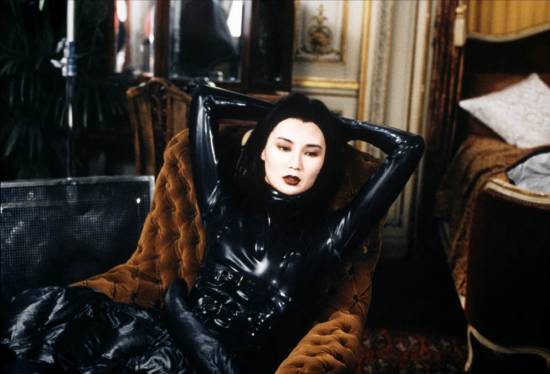
 Olivier Assayas pays homage to François Truffaut’s DAY FOR NIGHT in this piece of pseudoartistic fluff about a film crew’s attempts at remaking Louis Feuillade’s 1915 classic LES VAMPIRES. The great Maggie Cheung, who later married and divorced Assayas, is wasted as the star of the remake, and Truffaut regular Jean-Pierre Léaud, playing the director, is frustratingly unintelligible when he speaks in English, which unfortunately is a lot in this high-falutin’ mess. The film is being shown as part of “Post–Punk Auteur: Olivier Assayas,” consisting of seventeen films by the French writer-director, continuing through October 28.
Olivier Assayas pays homage to François Truffaut’s DAY FOR NIGHT in this piece of pseudoartistic fluff about a film crew’s attempts at remaking Louis Feuillade’s 1915 classic LES VAMPIRES. The great Maggie Cheung, who later married and divorced Assayas, is wasted as the star of the remake, and Truffaut regular Jean-Pierre Léaud, playing the director, is frustratingly unintelligible when he speaks in English, which unfortunately is a lot in this high-falutin’ mess. The film is being shown as part of “Post–Punk Auteur: Olivier Assayas,” consisting of seventeen films by the French writer-director, continuing through October 28.
 In conjunction with his recent appearance at the New York Film Festival discussing his life and career and presenting his latest film, the five-and-a-half-hour CARLOS, about the notorious assassin Carlos the Jackal, BAMcinématek will be screening seventeen of French writer-director Olivier Assayas’s works, which range from ultracool flicks to boring dramas, but they’re almost always visually stunning, filled with cinematic references and hip music. The series begins October 9 with SUMMER HOURS, which falls somewhere in the middle of his oeuvre.
In conjunction with his recent appearance at the New York Film Festival discussing his life and career and presenting his latest film, the five-and-a-half-hour CARLOS, about the notorious assassin Carlos the Jackal, BAMcinématek will be screening seventeen of French writer-director Olivier Assayas’s works, which range from ultracool flicks to boring dramas, but they’re almost always visually stunning, filled with cinematic references and hip music. The series begins October 9 with SUMMER HOURS, which falls somewhere in the middle of his oeuvre.